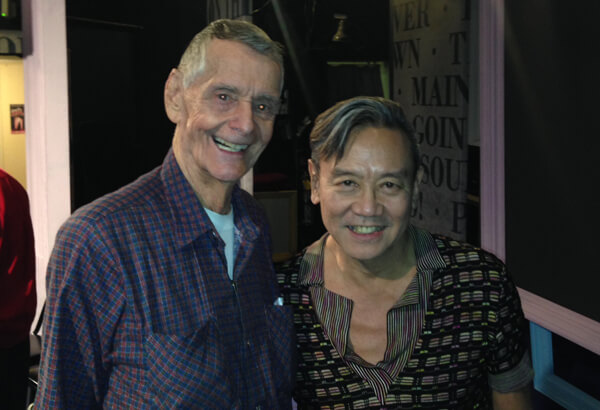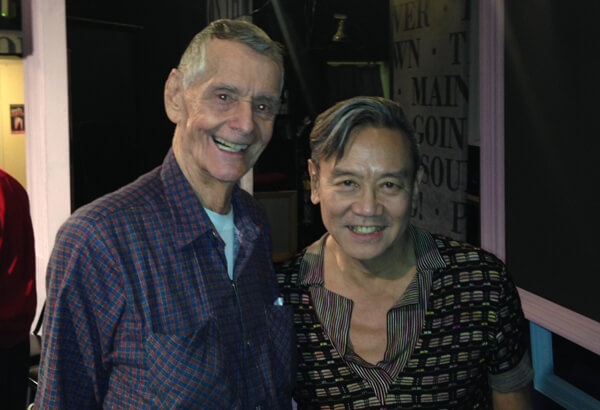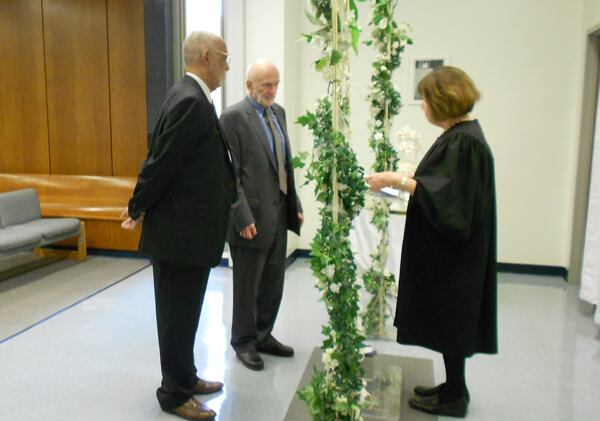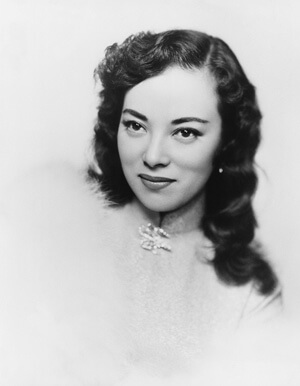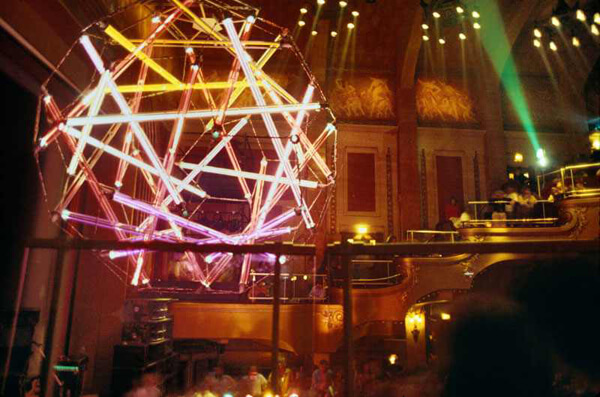Carlton Carpenter with this writer earlier this year at the New York Theatre Company’s retrospective panel “Remembering Mary Martin.” | COURTESY: DAVID NOH
At age 88, Carlton Carpenter is one of the very last survivors of Hollywood’s Golden Age of musicals, specifically MGM Studio, which signed him to a seven-year contract in the late 1940s. Lean and lanky, he was a charmingly gawky presence in films like “Father of the Bride,” “Two Weeks with Love,” “Summer Stock,” and “Sky Full of Moon,” but also appeared extensively on the stage and live television, besides writing books and popular songs. An indefatigable workaholic, his occasional appearances at New York events always elicit excitement from the generations of fans who have never forgotten him.
He’s wonderfully blessed with total recall, though he was caught up a bit short when I reminded him that he was featured on the cover of the Advocate way back in 1976, trumpeting his then daring move in coming out of the closet.
“I did?,” Carpenter gasped. “Somebody must have asked me! I’d forgotten about that. This guy did a whole big piece about me and asked, and I said, ‘Of course, I slept with a lot of guys. [chuckles] And I won’t name names, a gentleman doesn’t tell about that.’”
MGM’s eternal Boy Next Door, a NY Film Fest miss, and Mankiewicz’s hits
He was full of detailed memories in recounting his colorful life to me, which began in Bennington, Vermont : “Acting was all I ever wanted to do. My family supported my dreams and I worked constantly, from the age of four when a little girl and I sang ‘When You and I Were Young, Maggie’ at the Bennington Armory, for which we were paid a dollar, which we split.
“I got my Equity card on January 3, 1944 and remember that day so well. I bussed from Bennington to Albany and then a train to New York City. I checked my bag at Grand Central Station, walked to the St. James Hotel, bought a trade paper for five cents, and went for lunch at Child’s — mac and cheese.
“They were looking for 16-year-old boys for a play called ‘Bright Boy’, so I went to this hotel on 44th Street to the top floor. It was really cold and I was wearing my heavy Christmas coat. I heard voices and opened the door to a room which was jammed with guys. A man with a clipboard said, ‘You’re too old,’ and I was headed out the door when this guy grabbed my coattail and said, ‘He told me that six months ago and I’m still reading for the part!’ Off came my coat, I scrunched down behind him and the others, and lit a cigarette. I waited 40 minutes before clipboard guy came over said, ‘Okay, you’re next.’
“I went in and there was a long table with the director, playwright, and David Merrick, a young lawyer from St. Louis who was associate producer. I read for five different roles and was handed the script and told to read it. That took about an hour and they asked me what I thought of it. I said, ‘It’s the best thing I ever read.’ They said, ‘We want you in the show but don’t know for which part. Could you come in at 10 a.m.?’
“I arrived early at the hotel the next day and they asked, ‘What part do you see yourself in?’ I said, ‘Shakespeare,’ the nickname of a tall, lanky blonde boy who wants to be actor. ‘So do we,’ and we all shook hands, I signed a contract for $57.50 a week and I headed for the Equity office.”
On the strength of his appearance in “Bright Boy” and his next show, “Career Angel,” Carpenter was offered movie contracts with three studios, MGM, Paramount, and Fox.
“I loved the movies since I was a child, but all I really ever dreamed about was being onstage,” Carpenter recalled.
He made his first big splash in “Two Weeks with Love”: “Debbie Reynolds and I had done ‘Three Little Words’ together — one scene, in which she played the boop-boop-a-doop girl, Helen Kane. The studio liked the way we looked together and cast us in ‘Two Weeks.’ Originally we only sang in the ensemble numbers, ‘That’s How I Need You,’ and ‘The Oceania Roll,’ with Janie Powell.
“We were rehearsing the latter number when I saw a pile of sheet music stacked up on the piano, turn of the century songs. I picked out ‘Aba Daba Honeymoon,’ for the monkeys on its cover, and called Debbie over. ‘Such fun! I love monkeys!,’ she said. A couple days later, I saw our producer Jack Cummings headed into the studio. I told the pianist, ‘Just start here,’ and said to Debbie, ‘Let’s just sing it as fast as we can.’
“So we did and in the middle of it, Cummings came over and said, ‘You know, that would be a good number for the two of you!’ ‘Really?!’ And that’s how that happened. It was financially best thing I ever did in my life. It became a bestseller record, immense, the first soundtrack record that went right to the top of the charts and stayed there, a number one hit for months. We each got $10,000 in royalties and Debbie built a pool in her back yard. It was not a very big plot, so you came out the back door and it was right there — where we all hung out. Debbie was terrific, we stay in touch all the time.”
Carpenter was in Judy Garland’s final MGM film, “Summer Stock,” with Gene Kelly: “I adored her and she reminded me of Kaye Ballard, an old friend of mine, for whom I did material for her club act. Judy liked me a lot and invited me up to her place a lot. It was strange because she was kind of heavy but she lost a lot of weight for the ‘Get Happy’ number. I was on another film, but whenever I was off, I’d go and watch her do that number, which took several days to shoot.
“In the film, I played a piano player, and every time she’d take a break, she’d sit on my piano stool and throw her arms around my back. Mr. Kelly did not like me. I have no idea why. He said, ‘You know, I saw you in New York. You’ll be a star on groceries alone,’ which is what I thought he said. But he was talking about gaucherie, always with a smile on his face. He was mean to Debbie too on ‘Singin’ in the Rain,’ but it’s all past.”
Carpenter’s personal favorite of his films is “Sky Full of Moon”: “It’s a marvelous little film, intimate and simple, like a foreign film, and I still get strange and wonderful letters about it, mostly from directors and people like that. Norman Foster, who was once married to Claudette Colbert, directed it, Jan Sterling played my girlfriend, and Keenan Wynn, and it was my first starring role. I played a young guy who goes to Las Vegas for the first time to be in the rodeo. I ran into William Inge at a party two years later and he said, ‘Thank you.’ “Why?,’ I asked. ‘You know, I loved that film and I actually used it as the basis for ‘Bus Stop.’
“I broke my MGM contract after I came back from a tour during the Korean War. [Gossip columnist] Louella Parsons liked me personally — every other day I was in her column. I was scheduled to do ‘The Loves of Dobie Gillis,’ a part that was written for me, but she said, ‘You’re not going to do that. You’re going to do ‘Take the High Ground,’ which had already been done forever, a basic Army training film.
“Dore Schary had been hired as studio boss and there was a strange division between those with Schary ties and those loyal to [former MGM chief] Louis B. Mayer. I asked for a special meeting with Schary and was ushered into his office. Sitting across his big desk from him, I asked, ‘Why on earth would you take me out of ‘Dobie’, a film that I was assigned for, and put me in a war training film in which Edna May Oliver could have played my part?’ I still can’t believe I said that, but at any rate I got out of the contract, and ‘Seven Brides for Seven Brothers’ which would have been my next film. But I couldn’t have been happier and got cast in “John Murray Anderson’s Almanac” on Broadway.”
I asked Carpenter if he was sexually out during those early years: “No, nobody ever even asked me. If they had, I would have told them. It didn’t make any difference to me. I slept with a lot of guys, God knows, but I slept with a lot of women, too. [Actress] Barbara Ruick and I wanted to get married.
“But the gay thing never was an issue. I never thought about it and never had anything to fear from it. I never had a steady boyfriend then, only later on. I had a lover when I was back in New York, somebody I met in Chicago who built sets for ‘Mr. Roberts’ when I was doing it with Buddy Ebsen. We lived together for a while but I was working all the time and never really had any time for anything else.”
Carpenter has created his own rural utopia on five actors in upstate Warwick, in the Hudson Valley: “I’ve lived here for 45 years. I love it up here and I work constantly. I have written seven mystery novels, all still in print. I’ve also written songs like ‘Christmas Eve,’ which was a huge hit when Billy Eckstine recorded it in back in the 1950s.”
The annual New York Film Festival (filmlinc.com/nyff2014) opened at Lincoln Center with probably the most misogynistic film (written by a woman, Gillian Flynn) to ever have that honor, David Fincher’s “Gone Girl” (see also Steve Erickson's review). Relentlessly dark and edgy, over-elaborate and over-extended, this film, featuring the most psychotic female lead in recent memory, takes up where many famous film noir dames left off, but in a truly nasty, often stomach-turning way. One can only shake one’s head at the thought of so many people wanting to read the book it’s based on and watch such lurid, hateful garbage.
Far more rewarding is the festival’s “Joseph L. Mankiewicz: The Essential Iconoclast,” which pays tribute to this writer/ director whose best work represents the peak of Hollywood wit and style. The essential “All About Eve” is, of course, his masterpiece, but “A Letter to Three Wives” (Oct. 7, 8 p.m. ; Oct. 10, 6:30 p.m.) is nearly as good, and there are lesser-known gems as well to discover. “The Late George Apley” (Oct. 6, 9 p.m.) is a gleamingly literate, deeply charming adaptation from John P. Marquand’s novel about Beacon Hill Brahmins, featuring Ronald Colman in his best screen performance.
Likewise, the exquisite Gene Tierney and a surprisingly sexy and dashing Rex Harrison (both ridiculously Oscar-snubbed) have their finest onscreen moments in “The Ghost and Mrs. Muir” (Oct. 3, 6 p.m.), Mankiewicz’s most romantic film, with a superlative Bernard Herrman score and brilliantly moody cinematography by that great glamour man, Charles Lang. “The Barefoot Contessa” (Oct. 6, 6 p.m.) is juicily entertaining trash, starring the unspeakably luscious Ava Gardner, and I may actually steel myself and put myself through all 192 minutes of Liz Taylor’s “Cleopatra” (Oct. 13, 1:30 p.m.), a film I have never watched in its entirety.
Contact David Noh at Inthenoh@aol.com and check out his blog at http://nohway.wordpress.com.

